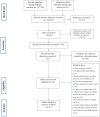Systematic review and narrative synthesis of the key barriers and facilitators to the delivery and uptake of primary healthcare services to women in Pakistan
- PMID: 37899162
- PMCID: PMC10619014
- DOI: 10.1136/bmjopen-2023-076883
Systematic review and narrative synthesis of the key barriers and facilitators to the delivery and uptake of primary healthcare services to women in Pakistan
Abstract
Objectives: The objective of this review is to (1) identify barriers and facilitators with respect to women's health services at a primary care level based on a systematic review and narrative synthesis and (2) to conclude with recommendations for better services and uptake.
Design: Systematic review and narrative synthesis.
Data sources: PubMed, BMC Medicine, Medline, CINAHL and the Cochrane Library. Grey literature was also searched.
Eligibility criteria: Qualitative, quantitative and mixed studies were included in the review.
Data extraction and synthesis: The search took place at the beginning of June 2021 and was completed at the end of August 2021. Studies were included in the review based on the Sample, Phenomenon of Interest, Design, Evaluation, Research type criteria. The quality of the included studies was assessed using the Mixed Methods Appraisal Tool. Data were synthesised using a narrative synthesis approach.
Results: A total of 33 studies were included in the review. We identified six barriers to the delivery of effective primary healthcare for women's health which have been organised under two core themes of 'service barriers' and 'family/cultural barriers'. Ten barriers to the uptake of primary healthcare for women have been identified, under three core themes of 'perceptions about healthcare service', 'cultural factors' and 'practical issues'. Three facilitators of primary healthcare delivery for women were identified: 'motivating community health workers (CHWs) with continued training, salary, and supervision' and 'selection of CHWs on the basis of certain characteristics'. Five facilitators of the uptake of primary healthcare services for women were identified, under two core themes of 'development of trust and acceptance' and 'use of technology'.
Conclusions: Change is needed not only to address the limitations of the primary healthcare services themselves, but also the cultural practices and limited awareness and literacy that prevent the uptake of healthcare services by women, in addition to the wider infrastructure in terms of the provision of financial support, public transport and child care centres.
Prospero registration number: CRD42020203472.
Keywords: health policy; primary health care; systematic review.
© Author(s) (or their employer(s)) 2023. Re-use permitted under CC BY-NC. No commercial re-use. See rights and permissions. Published by BMJ.
Conflict of interest statement
Competing interests: None declared.
Figures
Similar articles
-
Protocol for a systematic review of barriers, facilitators and outcomes in primary healthcare services for women in Pakistan.BMJ Open. 2021 Mar 24;11(3):e043715. doi: 10.1136/bmjopen-2020-043715. BMJ Open. 2021. PMID: 33762235 Free PMC article.
-
Beyond the black stump: rapid reviews of health research issues affecting regional, rural and remote Australia.Med J Aust. 2020 Dec;213 Suppl 11:S3-S32.e1. doi: 10.5694/mja2.50881. Med J Aust. 2020. PMID: 33314144
-
Barriers and facilitators of access to maternity care for African-born women living in Australia: a meta-synthesis of qualitative evidence.Syst Rev. 2024 Aug 9;13(1):215. doi: 10.1186/s13643-024-02628-8. Syst Rev. 2024. PMID: 39123244 Free PMC article.
-
The future of Cochrane Neonatal.Early Hum Dev. 2020 Nov;150:105191. doi: 10.1016/j.earlhumdev.2020.105191. Epub 2020 Sep 12. Early Hum Dev. 2020. PMID: 33036834
-
Barriers and facilitators to patient uptake and utilisation of digital interventions for the self-management of low back pain: a systematic review of qualitative studies.BMJ Open. 2020 Dec 12;10(12):e038800. doi: 10.1136/bmjopen-2020-038800. BMJ Open. 2020. PMID: 33310794 Free PMC article.
Cited by
-
A study protocol for integrating outpatient services at the primary health care level as part of the universal health coverage benefit package within the national health insurance program of Pakistan through private health facilities.Front Public Health. 2024 Mar 12;12:1293278. doi: 10.3389/fpubh.2024.1293278. eCollection 2024. Front Public Health. 2024. PMID: 38532967 Free PMC article.
-
Un/met: a mixed-methods study on primary healthcare needs of the poorest population in Khyber Pakhtunkhwa province, Pakistan.Int J Equity Health. 2024 Sep 23;23(1):190. doi: 10.1186/s12939-024-02274-5. Int J Equity Health. 2024. PMID: 39313795 Free PMC article.
-
Barriers and contributions of rural community health workers in enabling cancer early detection and subsequent care in India: a qualitative study.BMC Public Health. 2025 Apr 24;25(1):1527. doi: 10.1186/s12889-025-22735-y. BMC Public Health. 2025. PMID: 40275281 Free PMC article.
-
Perspectives on adherence to prescribed home exercises after polytrauma: A qualitative study.S Afr J Physiother. 2025 Jun 11;81(1):2163. doi: 10.4102/sajp.v81i1.2163. eCollection 2025. S Afr J Physiother. 2025. PMID: 40612926 Free PMC article.
References
-
- Population . Government of Pakistan, Pakistan economic survey 2022-23. n.d. Available: https://www.finance.gov.pk/survey/chapters_23/12_Population.pdf
-
- Chandrasiri J, et al. . Impact of out-of-pocket expenditures on families and barriers to use of health services in Pakistan: evidence from the Pakistan social and living standards measurement surveys 2005-2007. Asian Development Bank 2012.
-
- Hanedar E, Walker S, Brollo F. n.d. Pakistan: spending needs for reaching sustainable development goals (sdgs). SSRN Journal 10.2139/ssrn.4026282 - DOI
Publication types
MeSH terms
LinkOut - more resources
Full Text Sources

